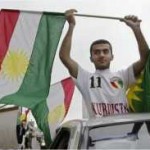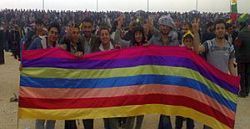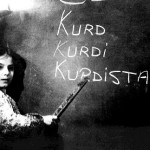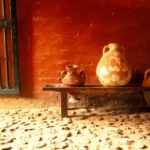An interview with a Kurdish Leader of Hebûn LGBT activist group
Diyarbakir city is the capital of the Diyarbakır Province in eastern Turkey. The population is about 1,600,000. Kurds are the predominant population today. Other groups include Turks, Assyrians, Armenians, Arabs and Yazidis. Kurds rarely make it onto the international media, and that’s even more so for Kurdish lesbian, gay, bisexual and transgender people, yet they do exist and have many stories to tell. So Gay Middle East traveled to the city of Diyarbakir in Eastern Turkey (or North Kurdistan), the center of the Kurdish culture in the region.
From: Gay Middle East
by Bradley Secker and Dan Littauer
February 9, 2012
Here you can hear people speaking proudly of themselves as being Kurdish, of their identity, culture and language. It is both ancient and modern, an oriental city enclosed by magnificent Roman walls and beyond the new Ofis district city beaming with social and cultural life. The Turkish military is always omnipresent, and mentioning Diyarbakir to most Turks in Istanbul will raise a few eyebrows and strike up negative images of street clashes, the PKK (the Kurdistan Workers’ Party which has been in an armed struggle with the Turkish state since 1984) and protests. (photo right: gay flag displayed in Diyarbakir for Newroz New Year festival 2008; photo credit–hevallo.blogspot.com)
The LGBT community in Diyarbakir struggles for space and recognition and the local organisation, Hebûn does its best to help. There are no bars or cafes that are specifically aimed at gay or trans people. Instead the organisation formed small social groups to meet at members’ homes. This is done to avoid the frequent discrimination and harassment in the mixed venues. Hebûn aptly means ‘to reappear, to come back into existence and life’ in Kurdish, and this group indeed plays a vital function here.
Hebûn is trying to find an office space and desperately seeking funding from various NGOs and LGBT organisations in the west of Turkey. So far they have had no success. Privately funding an office space is problematic because most openly gay, bi and trans people are forced into limited employment options such as sex work, although some have managed to run their own small businesses.
We attended a screening of the much-celebrated film Zenne Dancer. The film tells the (real) story of Ahmet Yildiz, a young Kurdish gay man who left Diyarbakir to Istanbul to live his life honestly and openly only to be murdered by his father for ‘shaming’ the family. The cinema was packed full with people standing on the aisles for lack of space. The film touched the audience in Diyarbakir deeply.
We interviewed Arif, one of the founders of Hebûn who did not wish to give his second name, and started by talking about the film.
‘There was a piece of us in each of the characters,’ he said. ‘I am in the same situation as Ahmet Yildiz: If I was honest, I would be killed by my family.’
When did the Hebûn group come into being?
Hebûn LGBT was founded in March 2010, when the previous group in the area, Hevijn disbanded. Hebûn is different from Hevijn because we are more proactive in our political activism. We currently have around 30 active members, and we are looking to raise the awareness, both locally and nationally of LGBT. We had some media coverage about our work and have taken part in the Istanbul Pride march last summer.
What are main issues that you think are affecting the lives of LGBT Kurds?
When Turkish LGBT have one problem, Kurdish LGBT will automatically have two. Your identity is rejected twice, and you have to fight for both your ethnic and sexual identity. We must gain acceptance from the LGBT community for being Kurdish, and from the Kurdish movement for being LGBT. Neither want to fully support us, although we support both ourselves.
We are funded by our transgender members’ work in the sex industry and from our personal funds. Although we have applied for various funding grants from Istanbul and Ankara, nobody has accepted our application and we haven’t heard anything from anyone.
Is there any risk to you personally, being one of the founders of Hebûn?
Yes, most of us have homes raided by police, thinking we are sex workers. The police are often abusive to us and we have no legal support from any organisation.
There is also the risk that our families will find out about us and our work. None of us are ‘out’ to family members, and we are constantly trying to hide our real selves from them. The younger members sometimes have to stay with friends as to escape from their families. My father would kill me if he found out that I’m gay, he’s a very religious man who has lived in Saudi Arabia for many years.
Does Hebûn LGBT have a Kurdish nationalist agenda also?
No, we are not a nationalist organisation, although sometimes their (Kurdish political parties) objectives run alongside those of our own, against the Turkish authorities. There is little awareness of LGBT rights within the Kurdish nationalist movement. We are also connected with several Iraqi Kurdish LGBT activists and organisations, and we help them in contacting groups throughout Turkey, as they do with us in Baghdad and Iraq.
Are you aligned with any other local groups, such as women’s rights groups or children’s associations?
Yes, and we have found this to be very positive. Some of our members work with local and national women’s rights groups, and sexual health advocacy organisations. We have found that there’s a lot of support, and more acceptance from within the women’s rights groups.
Would you consider making a publication in Kurdish, detailing your work, and local/national LGBT news, such as Hevijn did in the past?
 We are looking to do this, although it’s very difficult to find the funding. Our first priority is to find an office space from which to base ourselves, and have a free STI center within this. We hope this will become a reality soon.
We are looking to do this, although it’s very difficult to find the funding. Our first priority is to find an office space from which to base ourselves, and have a free STI center within this. We hope this will become a reality soon.
Do you think that the majority of LGBT Kurds from the south-east migrate to bigger cities in the west of Turkey? (photo left: Kurd rally)
I’d say that around 90% leave Diyarbakir and other Kurdish areas to live more openly life in Istanbul, Izmir or Ankara. But we won’t go, we want to live in our city and have a free life, so we will stay and fight for it.
There isn’t anywhere to openly socialise in Diyarbakir, and the authorities are always putting pressure on sex workers and effeminate people in the city. The biggest problem is that trans people are very limited in their work options, especially in such a conservative environment.
Watch the trailer for Zenne Dancer: Zenne Dancer.


















